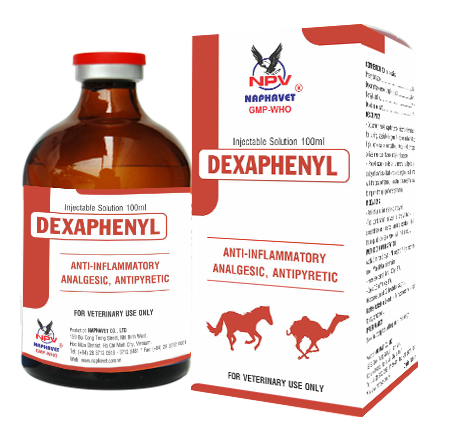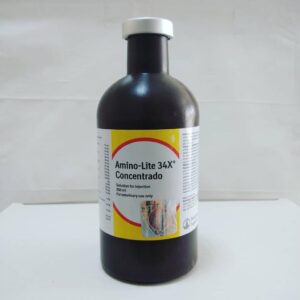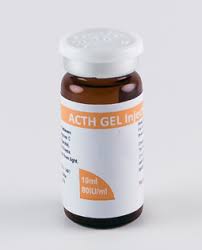Dexaphenyl Injection
Drug Interactions:
NSAIDs: Increased risk of gastrointestinal ulcers when combined with non-steroidal anti-inflammatory drugs.
Vaccines: Corticosteroids like dexamethasone can reduce the effectiveness of vaccines by suppressing the immune system, so vaccination should be delayed if possible.
Diuretics: May cause potassium loss when combined with diuretics, leading to hypokalemia (low potassium levels).
Antidiabetic drugs: Dexamethasone can raise blood sugar levels, requiring adjustments to insulin or other diabetes medications.
Precautions:
Short-term use: Dexaphenyl is often used for short-term relief of acute symptoms. Long-term use should be closely monitored to avoid side effects like adrenal suppression, immune suppression, and gastrointestinal issues.
Gradual Tapering: If used long-term, dexamethasone should be tapered off gradually rather than stopped abruptly to avoid adrenal insufficiency (a condition where the body cannot produce enough cortisol).
Monitoring: Animals on Dexaphenyl Injection should be regularly monitored by a veterinarian, especially for signs of infection, gastrointestinal problems, and changes in appetite or behavior.
Storage:
Storage conditions: Store Dexaphenyl Injection in a cool, dry place, away from direct sunlight and heat. It should not be frozen and must be kept out of the reach of children and animals.
Conclusion:
Dexaphenyl Injection is a valuable medication in veterinary practice, offering dual benefits of corticosteroid (dexamethasone) and antihistamine (diphenhydramine) actions. It is effective for treating allergic reactions, inflammation, and immune-related disorders, but it must be used carefully due to potential side effects. Always follow veterinary advice for proper dosing and monitoring, especially with long-term use.
Dexaphenyl
Dexaphenyl Injection is a veterinary medication that typically combines two active ingredients: dexamethasone and diphenhydramine. This combination makes it useful for treating a variety of conditions in animals, such as inflammation, allergic reactions, and certain immune-related disorders.
Here’s a detailed overview of Dexaphenyl Injection:
Key Components:
Dexamethasone: A synthetic corticosteroid with strong anti-inflammatory and immunosuppressive properties.
Diphenhydramine: An antihistamine that helps manage allergic reactions by blocking the effects of histamine, a chemical released during allergic responses.
Uses of Dexaphenyl Injection:
Allergic Reactions:
Treats conditions like skin allergies, insect bites, and other allergic responses in animals by reducing swelling, itching, and discomfort.
Inflammatory Conditions:
Useful for managing inflammation in musculoskeletal injuries, joint disorders (such as arthritis), or after surgery to reduce pain and swelling.
Respiratory Issues:
Helps in managing allergic respiratory conditions, such as allergic bronchitis or asthma, especially in dogs and horses.
Immune-Mediated Conditions:
Helps control autoimmune disorders where the body’s immune system attacks its own tissues, such as immune-mediated hemolytic anemia (IMHA) or skin conditions.
Anaphylaxis:
Can be used as an emergency treatment for severe allergic reactions (anaphylactic shock), which can be life-threatening.
Dermatological Conditions:
Useful in treating allergic skin diseases such as atopic dermatitis, which are common in dogs and cats.
Mechanism of Action:
Dexamethasone: Suppresses inflammation and immune responses by inhibiting the production of inflammatory chemicals (e.g., prostaglandins) and cytokines. It helps control swelling, pain, and immune overactivity.
Diphenhydramine: Blocks histamine receptors, preventing histamine from binding to its target tissues, which reduces symptoms like itching, hives, and swelling commonly seen in allergic reactions.
Dosage and Administration:
The dosage depends on the species, the condition being treated, and the animal’s size. Dexaphenyl Injection is administered via intramuscular (IM) or intravenous (IV) injection.
For horses: A typical dose may vary from 2 to 10 mg of dexamethasone along with an appropriate dose of diphenhydramine, depending on the severity of the reaction.
For dogs and cats: The dosage may range from 0.1 to 0.3 mg/kg of dexamethasone for anti-inflammatory or immunosuppressive effects, combined with diphenhydramine at an appropriate dose (usually 1 mg/kg).
Always consult a veterinarian to determine the correct dose for each specific case.
Side Effects:
Although Dexaphenyl is effective, it can have side effects, especially with prolonged use:
Dexamethasone-related side effects:
Increased thirst and urination (common with corticosteroids).
Increased appetite and potential weight gain.
Suppressed immune system, leading to a higher risk of infections.
Gastrointestinal ulcers, particularly when used long-term or combined with NSAIDs.
Adrenal suppression: Long-term use can inhibit natural cortisol production by the adrenal glands, leading to hormonal imbalances.
Laminitis in horses: Prolonged use of corticosteroids can trigger laminitis, a serious and painful condition affecting the hooves.
Diphenhydramine-related side effects:
Drowsiness: One of the most common side effects of antihistamines.
Dry mouth and urinary retention: Less common but possible side effects of diphenhydramine.
Contraindications:
Infections: Should not be used in animals with active bacterial, viral, or fungal infections unless they are being treated with appropriate antibiotics, as dexamethasone can suppress the immune system.
Pregnancy: Use with caution during pregnancy, as corticosteroids can affect fetal development and induce labor.
Diabetes: Dexamethasone may exacerbate diabetes by increasing blood sugar levels.
Heart Disease: Use cautiously in animals with heart disease, as corticosteroids can lead to fluid retention and worsen the condition.




Reviews
There are no reviews yet.